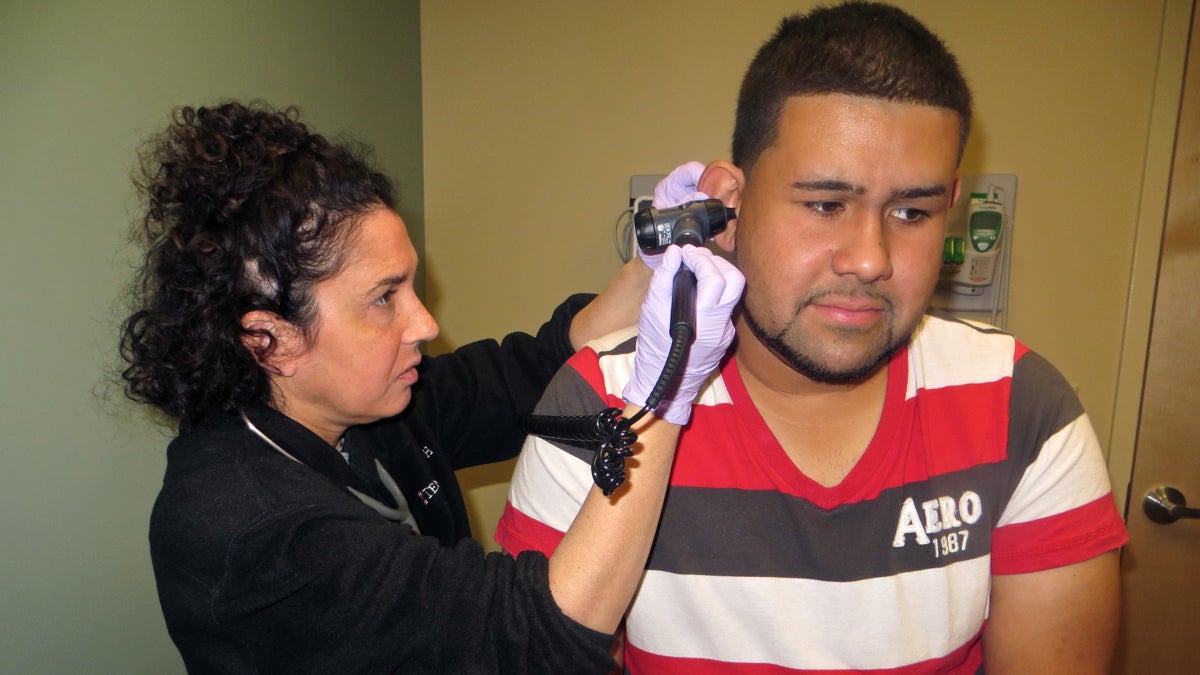Convenient-care providers can see you when your own doctor can’t
Listen
Dr. Robyn Baron examines 25-year-old Jerry Rodriguez at the newest Temple ReadyCare urgent care site on Cottman Avenue in Northeast Philadelphia. (Taunya English/WHYY)
When what ails you is troubling but not an emergency, there’s now an expanding array of options for seeing a doctor or getting patched up.
RediClinics have opened in Rite Aid stores in Ardmore, Media, Norristown, Langhorne, Philadelphia and 11 other places across the region all within the last six months. The drug-store sites are often open late and are typically staffed by a physician assistant or a nurse practitioner. You can get a summer-camp physical there or help if you have strep throat or an ear infection.
“Interestingly, about 40 percent of our patients say they do not have a primary care physician,” said RediClinic chief executive officer Web Golinkin.
Rite Aid, based in Camp Hill, Pennsylvania, acquired RediClinic about a year ago. The company’s familiarity with the market has explained, in part, the rapid expansion across this region.
Golinkin says RediClinics are often an “entry point” to the health care system for people who are newly insured or those who don’t already have a relationship with a doctor.
Critics of the convenient-care sector say too many patients get spotty care and never establish a “medical home” where someone is monitoring their health and encouraging prevention. That’s been an enduring worry since retail clinics started popping up a decade ago.
Golinkin, who said RediClinic sites are connected by electronic medical records, said his staff shares information with a patient’s primary care doctor whenever possible. Staffers also refer patients to primary care providers in the community, he said.
The convenient-care sector includes retail-based, walk-in “no appointment necessary” sites such as MinuteClinics inside CVS stores — as well as urgent care facilities.
Urgent care sites also welcome walk-ins but can deal with more complicated medical needs such as taking an X-ray or stabilizing a sprained ankle.
Attending to the interim need
“There’s always a doctor here, and we can do a little bit more than they can,” said Robyn Baron, a physician at Temple University’s newest ReadyCare location in Philadelphia.
“We believe that by helping in that interim need and seeing those patients where they have need, we can then redirect them back to develop a relationship with their primary, or if they don’t have a primary we can guide them toward a primary care physician,” said Marc Hurowitz, chief executive officer of Temple Physicians.
“For things like diabetes, chronic care, for preventive health services, pap smears, mammograms, colonoscopies, getting your annual blood work and physical examinations, those are things that are handled by the primary.”
In the first days after ReadyCare’s new facility opened on Cottman Avenue in Philadelphia, Baron said the most common complaint was from people suffering with allergies. For those with insurance, the co-payment is typically higher than a doctor’s visit but less than a trip to the emergency room, she said.
In this region, Jefferson University Hospital, the Rothman Institute, the Children’s Hospital of Philadelphia and Inspira all have urgent care sites.
Jerry Rodriguez, 25, walked into Temple ReadyCare with a fever around 1 p.m. and was in an exam room getting a check-up from Baron by 1:15 p.m.
“They take care of you faster, the medication goes faster to the pharmacy faster, they solve your problem quick,” Rodriguez said. “If not, they send you to the emergency room.”
He drove to the new location after encountering a two-hour wait at one of the other ReadyCare sites in Philadelphia.
The Medicaid program pays for Rodriguez’s care. While he has a doctor, Rodriguez said he didn’t even bother calling to make an appointment because he says it always takes months.
RediClinics accept commercial insurance plans and work with the Medicare program, but don’t yet accept Medicaid, Golinkin said.
A boon for health care?
The Robert Wood Johnson Foundation is studying the explosion of the retail clinic market. The foundation released an analysis from Manatt Health on the sector’s ability to improve population health.
The demographic of patients using retail clinics is largely driven by the neighborhood, and they tend to be located in higher-income urban and suburban settings, said health care researcher Jonah Frohlich.
“And because of their location, they, in large part, tend to be visited by patients who are middle and upper income,” Frohlich said.
When a consumer has a routine health care need and can’t book an appointment with the doctor — or doesn’t want to wait to see the doctor — retail clinics are an option.
“There aren’t enough primary care doctors around,” Golinkin said. That problem is growing as more people have gained health coverage through the Affordable Care Act, he said, adding that having insurance doesn’t mean you have access to care.
Frohlich said it’s not clear yet if retail clinics are helping to drive down the cost of medicine across the system. Some patients avoid spending money in higher-priced health care settings such as the emergency room. On the other hand, the convenience of retail clinics may prompt other patients to seek care more often than usual.
“If they are going because it’s convenient, but they wouldn’t necessarily have seen a physician or gone to an emergency department, or an urgent care clinic — if the retail clinic wasn’t there — then it’s possible that they are adding costs,” Frohlich said.
“I think it will probably take years and years for the medical community and others to completely accept the fact that we are helping to reduce costs, but my personal opinion is that we are,” Golinkin said. “That’s based on 10 years of experience in this business.”
WHYY is your source for fact-based, in-depth journalism and information. As a nonprofit organization, we rely on financial support from readers like you. Please give today.

